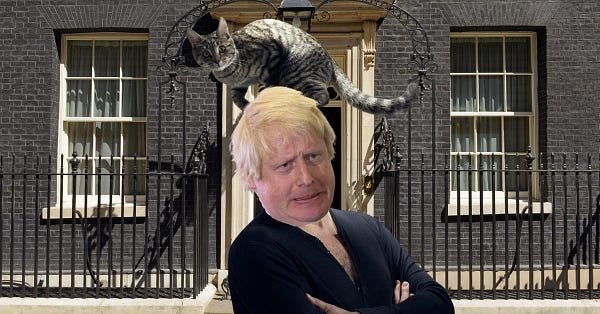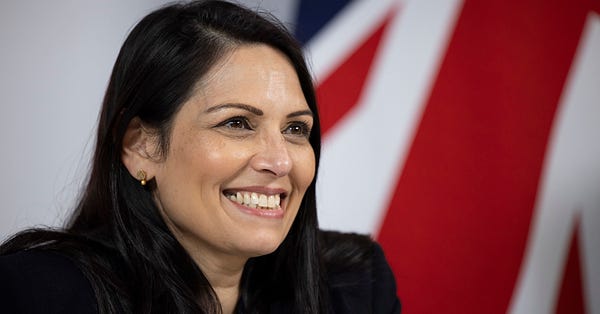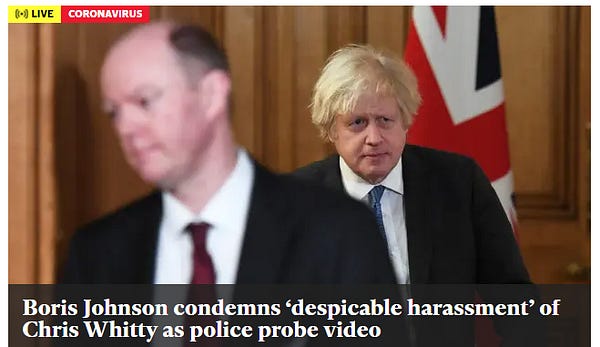Hack to basics: Of course Boris Johnson would lock up journalists, he's never been one
Calling the Prime Minister "a former journalist" is a serious category error.
There was much media tittering last week when Boris Johnson chose Waugh’s Scoop as his recommended summer reading in a 125th-anniversary survey by the Publishers Association.
Among the stunt picks (Shadow Home Secretary Nick Thomas Symonds straight-facedly offering up Aneurin Bevan’s In Place of Fear as a bumper beach read) and cunt picks (Rishi ‘keep the tags on’ Sunak’s claiming that he’ll be reading Twelve Yards by Ben Lyttleton, a history of the penalty kick), Johnson’s choice was the most tempting to psycho-analyze.
In The Times’ Diary column, Patrick Kidd wrote:
… Boris Johnson went to Waugh: specifically, Scoop. The prime minister surely does not identify with its hero, William Boot. He is hardly one to chase questing voles through plashy fens. The Johnson role model is more the man Boot replaces at The Beast: Sir Jocelyn Hitchcock, a reporter who can start revolutions simply by making up stories without leaving his hotel room.
Hitchcock — whom Waugh modelled on American-turned-British-establishment figure Sir Percival Phillips — is not a bad fit for Johnson. In Scoop, Waugh writes:
At a banquet given in his honour Sir Jocelyn Hitchcock once modestly attributed his success in life to the habit of ‘getting up earlier than the other fellow’. But this was partly metaphorical, partly false and wholly relative, for journalists are as a rule late risers.
A speech that is a cocktail of one part metaphor to two parts deceptions with an unhealthy glug of artistic licence is also the Boris Johnson approach. As Jeremy Vine recounted after him seeing Johnson ‘improvise’ the same funny speech on two different occasions, the Prime Minister has a predilection for pulling the same act over and over again, pretending each time is serendipitous.

But while the parallels with Hitchcock might be apposite, it’s grotesquely unfair to compare the ersatz bumptiousness of Boris Johnson with the real-life man, Sir Percival Phillips. Because Phillips was an actual journalist.
As recounted in his New York Times obituary, Phillips got his first job at The Monongahela Herald, joined the staff The Pittsburgh Times, then used $76 he had saved up to pay for passage to Greece where he covered the Greco-Turkish War by bicycle, having persuaded the publisher of The Chicago Inter-Ocean to take his dispatches after a chance meeting on the train to New York.
Phillips went on to be a renowned war reporter — the first line of the New York Times obit called him “last of Great Britain's five official front-line World War correspondents to remain an active reporter” — and The New York Herald which published his reports from the Western Front wrote:
He has, perhaps, seen more historic incidents in all parts of the world than any other journalist alive.
Boris Johnson began his career in journalism in 1988 — note I do not say “as a journalist” — by being fired from The Times for fabricating a quote from his own godfather, the eminent historian Colin Lucas. A lie that he concocted purely to stand up a spurious story about Edward II and Piers Gaveston.
Encouraged to revisit the incident 25 years later for an Independent article about his ‘greatest mistake’, Johnson — by then MP for Henley — offered his usual formula of excuses, equivocation and cheap gags. He wrote:
I was desperate to get hold of a historian who could help me, but the only one I knew was my godfather Colin Lucas, a very distinguished man who is now vice-chancellor of Oxford University… I rang him and he obligingly gave me some quotes about Edward II. The trouble was that somewhere in my copy I managed to attribute to Colin the view that Edward II and Piers Gaveston would have been cavorting together in the Rose Palace.
Unfortunately, some linkside don at a provincial university spotted that by the time the Rose Palace was built, Piers Gaveston would long have been murdered. It was very nasty. Colin hadn't quite said that, and now his academic reputation was on the line.
It was extremely difficult, and I had absolutely no idea what to do. I was 23, overcome with guilt and shame that this error – this howler of mine attributed to Colin – had crept on to the front page of The Times, which was holy territory for me. So I made matters worse. I wrote a further story saying that the mystery had deepened about the date of the castle.
Notice Johnson completely avoids taking responsibility. The copy just happened to attribute words to Lucas that never left his mouth. And the revelation of this deception is blamed on some unknown golf-obsessed don at a university that Johnson disdains, it not being Oxford, Cambridge or even, god forbid, Durham, that hellish place from whence Dominic Cummings came.


Most people would have struggled to find another role in journalism if they’d been revealed as an incompetent liar and sacked from their first job. It’s not so much the lying that would do for them — plenty of liars are accommodated in the British media — but that the lie was done quite so clumsily.
But despite that early issue, Boris Johnson has gone on to show himself as a liar at the elite level. If there were an Olympic event for liars — the 800m deceit or the shot put the blame on someone else — the Prime Minister would be odds on for gold every time. He lies with such ease and frequency that he often fervently believes things he made up just five minutes earlier.
After he was tossed out by The Times, Johnson was quickly hired by The Daily Telegraph as a leader writer — a role that requires more rhetoric and spin than it does a reporter’s grasp on facts — having met the then-editor Max Hastings at a party. Hasting later regretted his decision bitterly. He wrote in 2012: “ Boris is a gold medal egomaniac. I would not trust him with my wife nor – from painful experience – my wallet.”
In 1990, two years into Johnson’s long-stint with The Daily Telegraph — an association he has merely put on pause while he plays at being Prime Minister — he took a phone call from his old Bullingdon Club friend Darius Guppy, who had been his contemporary at both Oxford and Eton. Guppy wanted Johnson’s help in tracking down a journalist who had been looking into his dodgy dealings — dodgy dealings for which he would later be jailed — who he intended to beat up. Johnson was caught on tape agreeing to help Guppy in this enterprise.
In 2013, Eddie Mair pressed Johnson about the incident in the ‘nasty piece of work’ interview after the conversation had been broadcast again in a TV documentary:
MAIR: ‘The programme includes your reaction as you listen to a phone call in which your friend Darius Guppy asks you to supply the address of a journalist ... so that he can have him physically assaulted. Having heard that, you tell your friend, Darius Guppy, you will supply the address. What does that say about you Boris Johnson?’
JOHNSON: ‘It was certainly true that he was in a bit of a state and I did humour him in a long phone conversation, from which absolutely nothing eventuated and ... you know, there you go…people say all sorts of fantastical things whilst they’re talking to their friends.’
The truth was very different from Johnson’s distorted recollection. Guppy had planned with his partner in a gemstones firm to make it look like they had been robbed of jewels worth £1.8 million as part of insurance fraud. The scheme later fell apart and Guppy was jailed for five years.
But at the time Guppy called Johnson the dodgy dealings were still ongoing and he had heard that a News of the World reporter called Stuart Collier had begun digging into the details. Johnson, then The Daily Telegraph’s Brussels correspondent, agreed to get hold of Collier’s address.
While Sir Percival Phillips’ foreign exploits led to him being considered one of the world’s greatest war reporters, Boris Johnson’s time in Brussels merely cemented his reputation as one of its most mendacious. He was central in concocting the oft-repeated lie about the EU planning to ‘ban’ bendy bananas and was behind a raft of other distortions designed to enrage the Telegraph’s blimpish readership from one-size-fits-all ‘eurocoffins’ to alleging that the Commission was insisting on smaller minimum condom sizes because of ‘Italian concerns’.
Thirty years after Johnson inflated the condom story, the former European Commission spokesperson, Willy Hélin, spoke to The Guardian from his hospital bed to rage about that “load of old bullshit”. He continued:
We had had requests from medical institutions across Europe to check on the safety of condoms. That has nothing to do with the size of dicks. All the journalists went on about comparing the size of penises in Germany and France. It’s about safety because so many doctors were interested to know about the risks for Aids patients. [Johnson] was the paramount of exaggeration and distortion and lies. He was a clown – a successful clown.
In 1999 Johnson lied himself into the editorship of The Spectator. He assured the magazine’s then-owner Conrad Black that he would not try to become an MP while holding the job but did exactly that two years later when Michael Heseltine retired. Lying to Black, himself an inveterate liar, did Johnson no harm. While Black decried him as “ineffably duplicitous”, he couldn’t resist the PR upside of the preposterous editor and part-time parliamentarian who was all over television thanks to his Have I Got News for You appearances.
Johnson lied to Tory leader Michael Howard about his long-running affair with his Spectator subordinate Petronella Wyatt, during which he encouraged her to terminate two pregnancies, calling the claims “an inverted pyramid of piffle”. They were, in fact, a correctly orientated stack of facts. Howard fired him. Johnson sailed on unaffected, securing an increased majority in 2005.
When Andrew Neil, The Spectator’s chairman, dismissed him as editor that year, Johnson just asked The Daily Telegraph to bump up its annual fee for his weekly column by £50,000. That £250,000 — an amount he dismissed as “chicken feed” in an interview with Andrew Marr — meant Johnson was averaging £5,000 per piece, making him arguably the best-paid columnist in the country. In 2007, his earnings — the Telegraph wage combined with book advances and appearance fees — came to £540,000, making him the third-highest-earning MP.
During his two terms as London Mayor, Johnson remained a Telegraph columnist. When Dominic Cummings claimed in his Laura Kuenssberg interview last week that the Prime Minister had referred to The Daily Telegraph as his “real boss”, the only ‘shock’ came from political reporters play-acting. Johnson governs like he’s in a Daily Telegraph editorial meeting, grabbing a line for the day and defending it with all his might, dashing around from deadline to deadline, certain only of what he thinks today and concerned about how any given story will play.


This rat-like columnist tendency is also why I am not remotely surprised that a Johnson administration is pursuing policies that would make it much easier for the state to have journalists jailed for working with whistleblowers. This weekend former Guardian editor, Alan Rusbridger, wrote a piece in The Mail on Sunday under the headline It beggars belief that a government led by a former journalist wants laws that would make criminals of… journalists.
That seems like an odd bout of naivety from Rusbridger, a man who when he was Editor-in-Chief of the Guardian was obliged to destroy hard drives containing information provided by NSA whistleblower Edward Snowden under the watchful eye of two GCHQ officials. It’s also, as I hope the rest of this edition has demonstrated, a category error — Boris Johnson is not now nor has he ever been a journalist.
Boris Johnson was a liar from the first day he stepped into a newsroom and his commitment to deception has served him well from The Times to The Daily Telegraph to The Spectator to parliament, the Vote Leave campaign, and on through the Foreign Office all the way into Number 10.
Read the archives of Boris Johnson’s work — helpfully collected by The Daily Telegraph in a ‘Best of Boris’ section — and you won’t find journalism. There is no ‘speaking truth to power’, only obsequious loyalty to it and the Tory Party combined with cheap partisan jibes.
Boris Johnson’s commitment to the truth is about as strong as his marriage vows. And his time in journalism was about one thing: promoting the ‘Boris Johnson’ character that Alexander Boris de Pfeffel Johnson has used to get himself as close to his much-referenced childhood dream of “being world king”.
Rusbridger’s faux-naive tone in The Mail on Sunday piece extends to Priti Patel about whom he writes:
Maybe officials advising the Home Secretary, Priti Patel, hadn't read much about the history of journalism in Britain before proposing new legislation that would almost certainly see quite considerable numbers of journalists, editors and whistleblowers in jail.
I wonder if she has thought this through? Journalists are, as a profession, not greatly loved. But the British people do care about free speech and the liberty to think for themselves. They rather admire people who take huge risks to expose corruption, hypocrisy or deception in high places.
Again, a category error. A significant proportion of the British people care about free speech for them but aren’t overly worried about whether the ‘others’ get the same rights. There’s a big problem in journalism where high-handed hacks like Rushbridger believe that readers would really love to eat their greens and focus on true public interest stories if only the fast-food of tabloid papers wasn’t there to distract them. It’s just not true.
Similarly, when Rushbridger writes, with painful sincerity, that he believes…
… time inside wouldn't have stopped the Sun's editor, Victoria Newton, from publishing the story exposing the yawning, mid-pandemic hypocrisy of Health Secretary Matt Hancock … [and is] absolutely certain that Ms Newton means it when she says she'd willingly go to jail rather than reveal how she came by the video that eventually led to Mr Hancock's abrupt downfall.
… two words come to mind: Isabel Oakeshott. She and her then-editor at The Sunday Times, John Witherow (now editor of The Times), revealed to the Director of Public Prosecutions that Vicky Pryce was one of their sources. Pryce was sentenced to 8 months for perverting the course of justice and spent 9 weeks in jail. Isabel Oakeshott has suffered no consequences for burning her source. She is no ‘pariah’ in journalism; her byline still appears often and she is a regular radio and TV political pundit.
There is often a gulf between the way journalists talk about the ‘principles’ of our profession and what actually happens. News UK, where Victoria Newton plies her trade, handed over vast amounts of information on its own reporters when the time came to protect the company and her ultimate boss Rupert Murdoch.
Newton herself has been named in court papers during phone hacking actions on multiple occasions — claims she denies stenously — but if I were her I would not expect to be vigorously protected by Mr Murdoch if doing so would inconvenience him.

Rusbridger writes of Priti Patel getting herself “into this mess” and of Boris Johnson as a journalist who should know better as if either the Home Secretary or the Prime Minister are acting in good faith. They’re not. The idea of powers to shut down inconvenient questions from papers like The Guardian appeals to them greatly. It would not be The Daily Telegraph or The Sun that got hit with the consequences of new legislation to shut down whistleblowers. It would-be journalists and publications that the government doesn’t like.
Concluding his piece, Rusbridger says:
The Prime Minister is, famously, not a details man. But I suggest he asks an official to take a close look at the menacing threat to free speech that Ms Patel is proposing and stops them before this country's jails start filling up with editors, sources and journalists who still care about the value of our free institutions.
Again, he’s made a category error. The “menacing threat to free speech” is not a bug but a feature. It’s meant to be menacing and the Prime Minister, not a “former journalist” but a current and practising propagandist is actually quite comfortable with that. He knows the new weapons he wants to give the state will not be used against the chaps he likes but the commies and seditionists at all those newspapers that don’t support him and have never paid him in the past.



